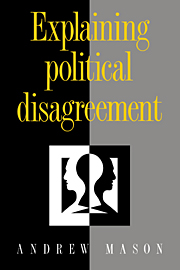Book contents
- Frontmatter
- Contents
- Preface
- Acknowledgements
- Introduction
- 1 Differences in values
- 2 The notion of an essentially contested concept
- 3 The miscommunication thesis
- 4 Integrating rational and non-rational explanations
- 5 A model for explaining some moral and political differences
- Concluding remarks
- Appendix
- Bibliography
- Index
3 - The miscommunication thesis
Published online by Cambridge University Press: 18 December 2009
- Frontmatter
- Contents
- Preface
- Acknowledgements
- Introduction
- 1 Differences in values
- 2 The notion of an essentially contested concept
- 3 The miscommunication thesis
- 4 Integrating rational and non-rational explanations
- 5 A model for explaining some moral and political differences
- Concluding remarks
- Appendix
- Bibliography
- Index
Summary
The thesis that key political concepts are essentially contested, a qualified version of which I defended in the last chapter, maintains that disputants employ the same concepts but interpret them differently. That belief stands in need of justification, however, for it has been argued that people disagree on political matters precisely because they lack shared concepts. According to this position, those who disagree politically employ key terms to express different concepts and in consequence simply talk past each other; they are not involved in genuine disagreements at all.
This general view, which I shall call the miscommunication thesis, comes in different versions. In some versions, the explanation it provides for the fact of political disagreement fits the imperfection conception, since it allows the possibility that miscommunication can be avoided through more careful use of language. For example, Locke argues that moral and political disputes are largely due to the misuse of words: people use different terms to stand for the same idea, and the same term to stand for different ideas. He claims that provided we are clear about which ideas our moral terms signify, disagreements can be cleared up to the satisfaction of any reasonable person and we can gain true moral knowledge.
- Type
- Chapter
- Information
- Explaining Political Disagreement , pp. 69 - 96Publisher: Cambridge University PressPrint publication year: 1993



